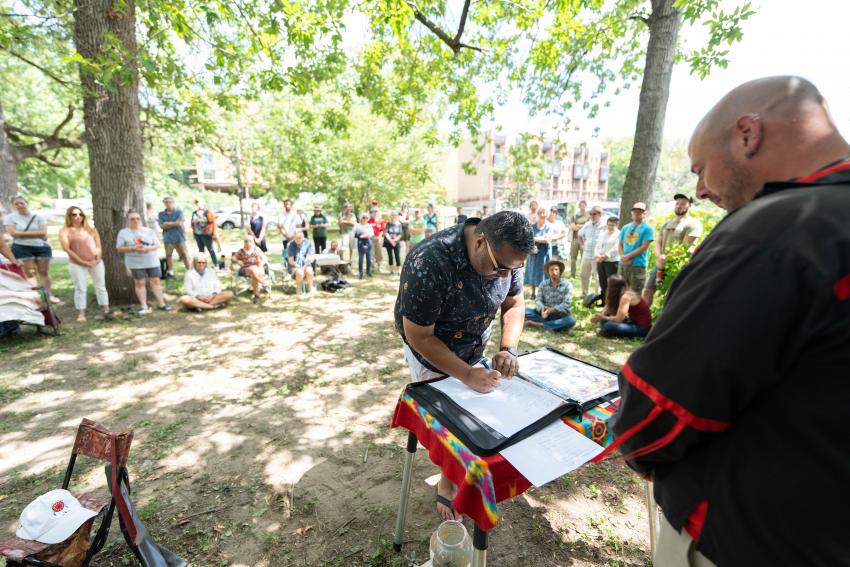Arcadia Reaffirms Lenape Partnership with Treaty Signing

In summer and fall 2021, a group of Arcadians worked with the Lenape Nation of Pennsylvania to draft a land acknowledgement statement recognizing that the Lenape People were the first caretakers of the land where the University now sits. The statement notes that Arcadia honors the Lenape’s “historical legacy and vibrant culture” and is “committed to collaborating with the Lenape, as neighbors and friends.”
This month, Arcadia put action behind its words. As part of the Lenape’s Rising Nation River Journey, a quadrennial trek down the Delaware River via kayak and canoe to raise awareness of their legacy, culture, and beliefs, the University joined other colleges, environmental groups, churches, historical societies, and individuals in signing a treaty of renewed friendship.
“I saw this as a chance to further our partnership with the Lenape,” says Favian Alejandro Martín, Ph.D., associate professor of Criminology and Criminal Justice and director of the Criminal Justice Program. “It’s a way to acknowledge that we’re actually trying to further understand their history, culture, and people.”
Earlier in the summer, Martín had accompanied Arcadia’s Gateway Program students to the Lenape Cultural Center, in Easton. Martín met with Lenape Peoples Storyteller Adam DePaul, who had assisted with Arcadia’s Land Acknowledgement Statement last year. DePaul invited the University to participate in the Rising Nation River Journey and treaty signing.
Martín was at East Falls River Landing, in Philadelphia, to sign the treaty on Arcadia’s behalf on August 16. At the ceremony, Martín spoke about Arcadia’s commitment to further understanding the historical legacy and the culture of the Lenape Peoples and discussed opportunities for collaboration between the university and the Lenape People.
In the Gateway class, Martín says, students were surprised to learn about the many challenges that indigenous peoples continue to face.
“We talked about how Native Americans have the highest rates of chronic victimization,” he says. “They’re twice as likely to be victims of violent crime in America, and women are three times as likely to be victims of rape and sexual assault. People don’t understand that.
“Many folks living on Indian reservations don’t have access to proper plumbing,” he continues. “They don’t have access to electricity, heating, and phones. Students are amazed that in a country that’s supposed to be a superpower, we have people living in extreme poverty. It’s eye-opening for them.”
Martín notes that with the Lenape population growing older, there is a danger that their culture will fade away. The partnership symbolized by the treaty signing, he says, is a way to keep Native Americans visible among the rest of society – which, in turn, could help with cultural preservation. And for the University, the treaty is a reminder of Arcadia’s social responsibility.
“We want to continue working with the Lenape Nation and honor their land,” Martín says.


